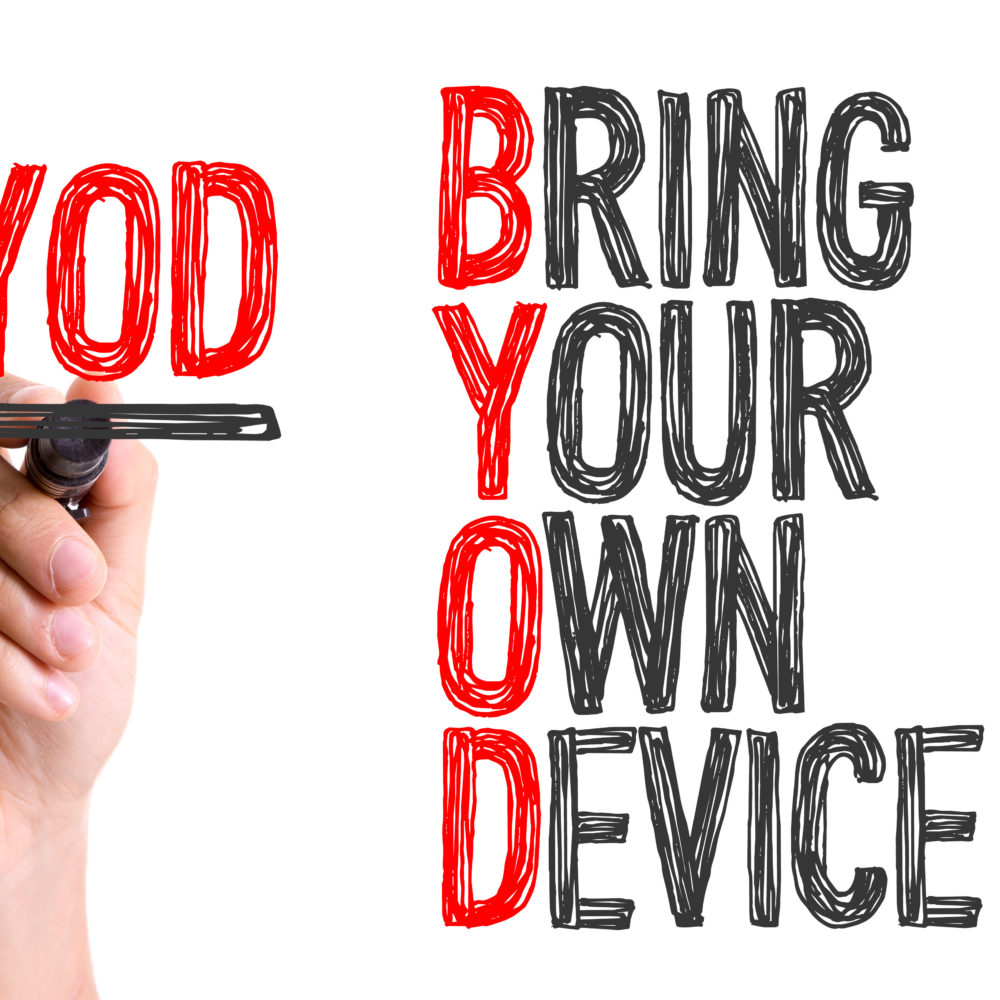Why Businesses Should Make the Investment for Employees
Mobility has become a major asset for modern businesses. It gives companies an edge when employees can work from anywhere with remote access on any device ranging from a cell phone, tablet, smartwatch, or laptop. Mobile technology has enabled unsurpassed flexibility in the workplace the likes of which the world has never seen before.
But as Spiderman’s Uncle Ben said, “With great power comes great responsibility.” When it comes to mobile devices, many business leaders wonder which is better: Allowing employees to bring their own devices to work or dropping the money to provide enterprise devices to all employees.
The Advancement of Technology
The development of the smartphone has shifted the way people communicate on a daily basis. In a recent survey conducted by Zinwave, “Over 85 percent of respondents, which included more than 1,000 office workers within the United States, utilize their cell phones on a weekly basis, at a minimum, for external communications, and usage was only slightly lower for internal communications.”
Not only do modern workers use their phones for voice capabilities (i.e. phone calls), but they use email through their phones as a prime form of communication. The aforementioned Zinwave study found email was the preferred means of external and internal communication for people while they are at work.
The ability to access the internet, company information, and messaging services (text) has made smartphones and tablets a necessity when it comes to productivity in modern business. “For example, 65 percent of industrial and 62 percent of healthcare workers utilize work-related data daily for a variety of applications,” according to Zinwave.
Technology has removed boundaries, improved flexibility, and enhanced communications with lower overhead costs. It can be tailored to the user experience and specific needs of any business. Mobile technology has even allowed organizations to increase their revenue potential.
“In our information-rich society, there are two critical types of interactions that must be fostered: employee empowerment and customer engagement,” according to the blog “6 Ways Mobility Can Transform the Workplace” by iOffice. “For many, mobility has become the backbone of their interactive strategy.”
The BYOD Market
According to an online article at GlobeNewswire, the U.S. BYOD market size was $30 billion in 2014 and is expected to grow 15 percent by 2022.
“Declining hardware prices, increasing mobile user workforce, and high smartphone penetration are the factors responsible for increasing BYOD market share across the region,” according to the article, which sourced BYOD research by Global Market Insights. “Increasing personal technology along with IT consumerization is also expected to boost the industry.”
While the popularity and benefits of mobile devices speak for themselves, business leaders must consider whether to allow BYOD or provide the devices for employees. Traditionally, BYOD was a highly accepted practice. Recently, there has been a move to corporate owned, personally enabled devices (COPE), the practice of organizations providing employees with mobile devices due to concerns over security, IT compatibility, and legal issues over user privacy versus company control.
At ORAM Corporate Advisors, our recommendation for mobile device management is that every employee should have a corporate-owned device. With an enterprise device, you can manage all of the security, firmware upgrades, software applications, and tracking your employees require to do their job. Additionally, COPE offers many other benefits.
Providing Mobile Devices
When your business owns the line of service for its devices, it has more control. You get to select the devices you prefer your employees to use rather than paying for and having the headache of supporting all device types. Additionally, you get to keep your devices up to date so you aren’t forced to make your network support older devices.
Protecting Your Assets
A study from Wall Street Journal Custom Studios commissioned by Symantec, showed “79 percent of employees admit to engaging in risky behaviors- intentionally or unintentionally- that place corporate data at risk” and “48 percent of employees don’t think about security risks when transferring files or sharing documents over cloud-based services.”
With corporate devices, you’re protecting your business assets. If your business owns the devices employees use, you’re able to wipe them in case they are stolen or lost somehow. This can be done remotely and quickly for theft or loss to prevent personally identifiable information (PII), trade secrets, or other secret data from falling into the wrong hands.
If a device such as a smartphone is owned by the company, you can simply call the phone carrier and wipe the phone’s memory. You request this by stating, “I need access to X, Y, Z employee’s phone. Here are the records that we are authorized to do so.” If the phone is a BYOD that’s accessing the corporate information, your business doesn’t have that same ability. The employee owns access to the account and the functions of that device.
Easy Access & Support
The same is true of the ability to access data easily. This is important when every minute counts in business. Take a smartphone for example. If there are any files, emails, or different communications downloaded to a phone on a corporate account, you’re able to search and query that device on demand. This is an improvement over waiting for an employee to submit paperwork at the end of the month in their call log when you need information immediately.
In addition, employees who use COPE devices have support from your IT department. Employees’ personal devices may not be compatible with your business network which could cause functionality issues. With corporate-owned devices, employees can simply contact IT for assistance.
Regulatory Compliance
COPE devices allow a company to reduce their exposure to security risk as well as legal and human resource issues. With tighter control through COPE devices, your business can implement the security measures it needs to keep its data and network safe. Furthermore, litigation resulting from breaches, loss of data, and regulation non-compliance is reduced.
In a highly-regulated industry such as finance, your business will need to be able to report such instances of loss or theft against that device to regulatory agencies such as the Securities and Exchange Commission. This is especially important should your business be audited or examined by such an entity.
The Money Factor
You may be thinking that providing mobile devices such as phones, tablets, and laptops to your employees is not cost effective, but the fact is that it can be. First, consider that many organizations provide a stipend for employees who bring their own devices. That stipend in and of itself is a cost. If you’re going to have the cost regardless, you should have the control as well.
Group mobile plans are getting less expensive for businesses of all sizes and can be written off as a business expense on taxes at the end of each year. In addition, when it comes to tablets, laptops, and other mobile devices, organizations buy in bulk to get a better price which benefits both the business and the employee. Another option for reducing the cost is to set up a cost-sharing option for both the device and its use with your employees.
Finally, when it comes to keeping your business secure to avoid regulatory penalties for non-compliance, the potential for lost revenue, and easy access to data, the investment up front is worth the return. That sense of security is priceless for most business leaders who wish to avoid potential breaches, lost revenue, and issues that can be caused by disgruntled employees.
The Employee Factor
Consider your best salesperson. If they use their personal devices to access your business information such as sales logs, client contacts, and invoices, they have information that could potentially damage your business financially if they were to leave.
In addition, your salesperson likely gives your clients that personal mobile number so they can contact them if they need anything. If your salesperson were to leave the company, your clients would still call that salesperson who can then easily take your customers to their new company with them. This means a loss of revenue for your business.
Should an employee leave, your business gets to keep the phone number. This means their clients will still be contacting one of your employees at your business through the same phone number. This reduces the odds of lost revenue for your company.
Create Policy & Enforce It
Every business, especially those in highly-regulated industries, should create policies regarding BYOD. This is true regardless of whether you allow BYOD or employ COPE devices in your business. You need a very secure policy and the correct mobile device management in place. In addition, your policy should outline that only legitimate work will be conducted on these devices.
If you need assistance with BYOD or COPE devices, creating policy, or mobile device management, contact ORAM today at (617) 933-5060. Our IT and security experts are always here to help your business grow smart while reducing its risks

